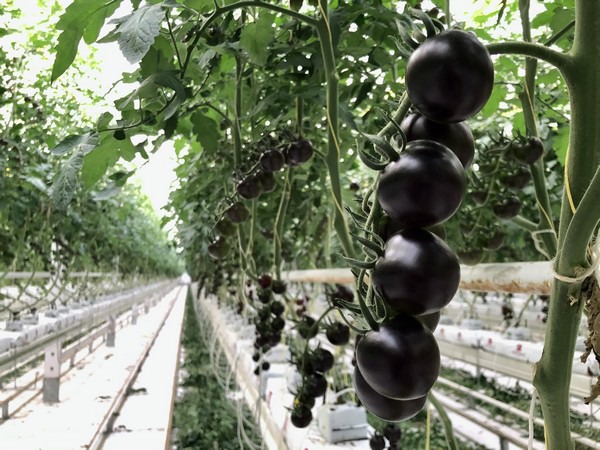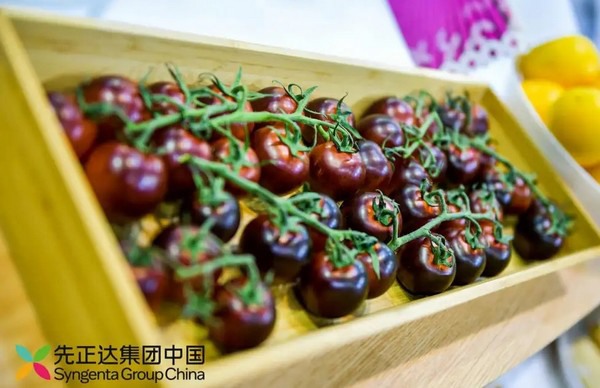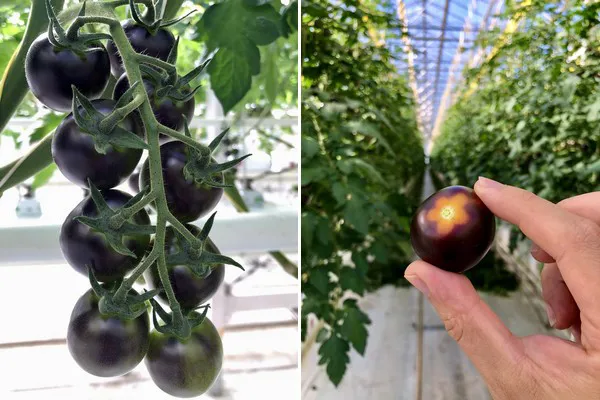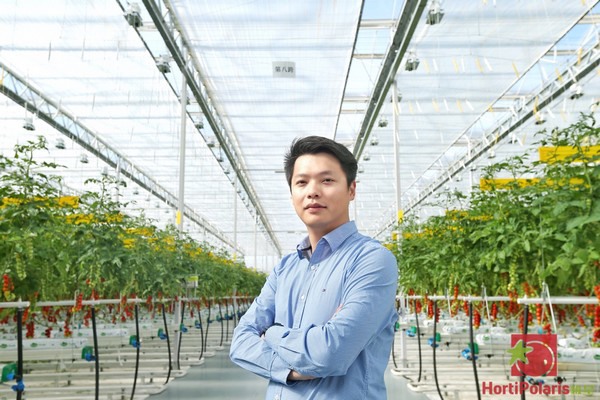They are purple and shiny and gained a lot of attention at the first China International Import Expo in Shanghai. From the middle of November they'll enter the Chinese market in large quantities. It's the Yoom tomatoes we're talking about. This purple variety is being grown in a trial by a small amount of Chinese growers. Among them Beijing Hortipolaris. This Chinese company is the first one to harvest these tomatoes and introduce them to Chinese consumers. Mr. Xu Dan with Beijing Hortipolaris, and manager Wu Haiyan, with Syngenta Group China, recently shared more on the special characteristics of Yoom tomatoes.

Hortipolaris plantation
Traditional breeding
Wu Haiyan with Syngenta Group China explains how the Yoom tomato is a new brand put forward by Syngenta China. "The tomato variety for this brand has been selected through traditional breeding technology. Only the most promising varieties were further cultivated, until the best variety was found."
"This tomato variety is rich in anthocyan and great in taste, but the most striking feature is its color. The Yoom tomato is a deep purple tomato, rather than the traditional red. This is because the tomatoes receive relatively little sunlight, which leaves the tomato skin a deep purple.
Furthermore, Yoom tomatoes are cocktail tomatoes, rather than the commonly-seen cherry tomato. "The average Yoom tomato weighs around 35-40 grams. This is not a common size for tomatoes in the Chinese market. However, market feedback shows that compared to all kinds of tomatoes in the Chinese market, the YOOM tomato is quite suitable for growing in China."

Syngenta Group China displays YOOM tomatoes at the China International Import Expo in Shanghai
Europe, Australia, North America, Mexico
"The YOOM tomato variety has been researched and cultivated for decades. This variety is already introduced in Europe, Australia, North America and Mexico, where growers have already devoted larger areas to this tomato variety. We are proud to be one of the first companies in China to introduce this tomato variety to the Chinese market," said Mr. Xu Dan, spokesperson for Beijing Hortipolaris.
"Since it's a trial the first harvest is only small, but the production volume per hectare and the product quality are both promising. Furthermore, we received great market feedback from visitors at the China International Import Expo in Shanghai. People are welcoming this new variety with interest. We also received many inquiries from colleagues who are interested in this tomato variety. They are eager to try planting this variety as well."

YOOM tomatoes at Beijing Hortipolaris
The living standards of Chinese consumers are continuously improving, which makes people more conscious of healthy food. This trend has only grown during the Covid-19 pandemic. Manager Xu sees great market potential for the Yoom tomato.
"The Yoom tomato is considered a high-end market tomato, and the price is 3-4 times higher than the regular red cherry tomato, but the Yoom is also much richer in minerals, anthocyans, and carotenes. The Yoom tomato has an extremely high nutritional value. In addition, this variety has just the right balance between sweet and sour, and the fragrance is quite rich. The Yoom tomato can be used in cooking or enjoyed as a snack. That is why, although the price is high, I think this high-end market tomato has a huge potential in first- and second-tier markets."

Mr. Xu Dan, CEO of Beijing Hortipolaris
Summer weather
Beijing Hortipolaris owns a 3.3 hectares greenhouse in Miyun county, Beijing. The company mainly sells their products in high-end supermarkets and high-end restaurants and hotels in first- and second-tier cities throughout China. "Excessive rainfall during the summer even had an effect on tomato production in greenhouses. The overall production volume declined somewhat. In addition, the outbreak of Covid-19 reduced the availability of workers, which slowed down production. Domestic vegetable industries encountered many challenges this year, but these challenges also drew attention to questions about high-tech horticulture and their use in times of crisis. We hope to use our expertise and years of experience in the greenhouse industry to help other companies with questions about greenhouse technology and management methods, so that together we can improve this industry."
For more information:
Mr. Xu Dan - CEO
Beijing Hortipolaris
E-mail: [email protected]
Wu Haiyan - Spokesperson for Smart Glass Greenhouse Products
Syngenta Group China
E-mail: [email protected]
